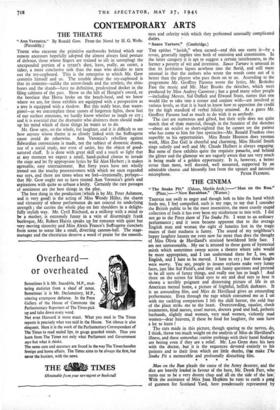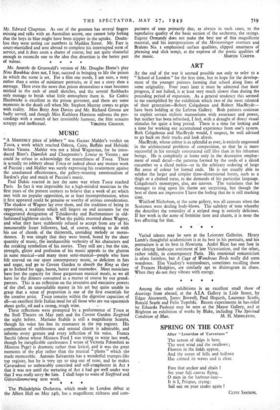THE CINEMA
" The Snake Pit." (Odeon, Marble Arch.)-" Man on the Run." (Plaza.)-" Now Barabbas." (Warner.) THOUGH not swift to anger and though loth to bite the hand which feeds me, I feel compelled, such is my rage, to say that I consider the British public to be the most insensitive, the most crassly stupid collection of fools it has ever been my misfortune to mix with. I did not go to the Press show of The Snake Pit. I went to an ordinary performance ; and it soon became apparent that to the average English man and woman the sight of lunatics lost in the tragic mazes of their madness is funny. The sound of my neighbour's happy laughter haunts me even now far more than does the thought of Miss Olivia de Havilland's strained bewildered little face. I am not unreasonable. . My ear is attuned to those gusts of hysterical mirth which sometimes sweep across a theatre where sobs would be more appropriate, and I can understand these for 1, too, am English, and I hate to be moved. I hate to cry ; but these laughs were merry. You see, people in insane asylums make very funny faces, just like Sid Field's, and they ask funny questions and pretend to be all sorts of funny things, and really one has to laugh ! And there on the screen for blind eyes to see and deaf ears to hear is shown a terribly poignant and distressing picture of life in an American mental home, a picture of frightful, hellish darkness. It is an astounding film, and Miss de Havilland gives an astounding performance. Even through the rage which consumed me as I sat with my cackling compatriots I felt the chill horror, the cold fear of the place strike me to the heart. Overcrowding, squalor, shock treatments, kind nurses, cruel nurses, doctors good and bad, pathetic husbands, slightly mad women, very mad women, violently mad women—dear heavens, if these be food for laughter, the sane have a lot to learn I The cuts made in this picture, though sparing to the nerves, do, I think, throw too much weight on the analysis of Miss de Havilland's illness, and these somewhat :outine probings with their banal findings are boring even if they are a relief. Mr. Leo Genn does his best with the doctor, but it is the sequences devoted entirely to his patients and to their lives which are little deaths, that make The Snake Pit a memorable and profoundly disturbing film.
* * * *
Man on the Run pleads the cause of the Army deserter, and the dice are heavily loaded in favour of the hero, Mr. Derek Farr, who turns out to be a very decent chap and all on the side of the law. With the assistance of Miss Joan Hopkins he runs to earth a gang of gunmen for Scotland Yard, here ponderously represented by
Mr. Edward Chapman. As one of the gunmen has several fingers missing and talks with an Australian accent, one cannot help feeling that the boys in blue might have been nippier in the uptake. Doubt- less they were noting car numbers in Maddox Street. Mr. Farr is court-martialled and sent abroad to complete his interrupted term of service, and it does seem a shame of course, but not quite shameful enough to reconcile one to the idea that desertion is the better part of valour. * * * * Mr. Anatole de Grunwald's version of Mr. Douglas,Home's play Now Barabbas does not, I fear, succeed in bringing to life the prison in which the scene is set. For a film one needs, I 'am sure, a story rather than a series of miniature portraits, or if not a story then a message. Here even the news that prison demoralises a man becomes mislaid in the rash of small sketches, and the several flashbacks only manage to break what little atmosphere there is. Sir Cedric Hardwicke is excellent as the prison governor, and there are some moments in the death cell when Mr. Stephen Murray comes to grips with reality. Miss Betty Ann Davies and Mr. Richard Greene are badly served, and though Miss Kathleen Harrison enlivens the pro- ceedings with a snatch of her irresistible humour, the film remains







































 Previous page
Previous page